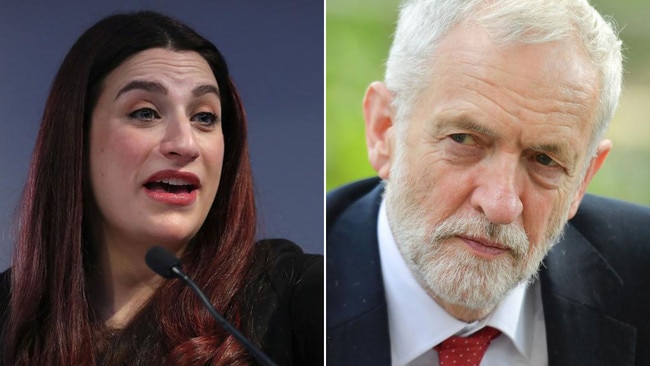UK politics: Corbyn’s inner circle is quashing all dissent

A few weeks ago, Jeremy Corbyn was challenged in the shadow cabinet about his handling of Labour’s apparently never-ending anti-Semitism crisis. Tom Watson, the deputy leader, and Sir Keir Starmer, the shadow Brexit secretary, demanded to see the party’s submission to the Equality and Human Rights Commission inquiry. They argued that, as Labour’s most senior elected representatives, the shadow cabinet had both a right and a responsibility to review the text on which the party’s reputation could depend.
Their request was refused. Jennie Formby, the general secretary, told the shadow cabinet that not even Mr Corbyn had seen the evidence. Mr Watson also raised the issue at the National Executive Committee, insisting that Labour’s ruling body should be able to debate and approve the party’s official response to the investigation. Again he was told that it was none of his business.
It is astonishing when you think about it.
The country’s official equalities watchdog has launched an inquiry to determine whether Labour “has unlawfully discriminated against, harassed or victimised people because they are Jewish”.
It will, the commission says on its website, examine “whether unlawful acts have been committed by the party or its employees or agents” and “whether the party has responded to complaints of unlawful acts in a lawful, efficient and effective manner”.
This is an institutional investigation and so the party’s ruling bodies in parliament and the country have what one senior MP calls a “corporate and political authority” to sign off Labour’s submission — but neither the shadow cabinet nor the NEC have even been allowed to read it.
“That’s not democratic,” says a frontbencher. “For whom does this document speak if it has not been cleared by the shadow cabinet or the NEC?”
It’s part of a pattern of behaviour that appears to prioritise the preservation of a hard-left clique over the wider electoral interests of the party.
On Wednesday the BBC’s Panorama will broadcast further evidence of interference in anti-Semitism cases by Mr Corbyn’s team as well as reports of a bullying atmosphere in his office.
Cover-up more preferable than clean-up
Eight former officials have agreed to be interviewed on camera, some of them breaking nondisclosure agreements to do so, but instead of facing up to the very real questions raised by the program, Labour has accused the BBC of bias and sought to silence the whistleblowers.
Cover-up is apparently preferable to clean-up. According to a shadow cabinet minister: “There’s an element of incompetence and inexperience but that lets [the leader’s office] off the hook. You have got to put it in the box of misuse of power, failure to respect democratic norms and conventions, disrespect for the notion of pluralism, and a complete disregard for Labour Party history, purpose and values.”
Lord Falconer of Thoroton, the former Lord Chancellor, who was asked by Mr Corbyn earlier this year to oversee the anti-Semitism complaints process, had put his investigation on hold until after the EHRC had reported. He is now so worried that Labour is “normalising anti-Semitism” that he would be willing to start immediately — but the party no longer wants him to be involved. “The process is being used to protect those who line up on the side of the anti-Semites,” he told me. “It is horrific.”
Last week the Labour leader and his allies were quick to demand an independent inquiry into civil service leaks but they prefer to keep it in the family when it comes to investigating allegations about their own behaviour.
One victim of sexual harassment who went to see the leader felt intimidated and upset when Karie Murphy, Mr Corbyn’s chief-of-staff, sat right next to her on a sofa and loomed over her while insisting there was no need for a fully impartial complaints process.
‘You need to learn your place’
There is a bunker mentality at the top of the Labour Party that is undermining any sense of moral credibility or political clarity. MPs have been sidelined — one was told by a member of the leader’s team: “You need to learn your place.”
Those around Mr Corbyn assume that any criticism is driven by personal hostility to him rather than a genuine difference of opinion on policy or strategy. Just as the hard left has forged strange alliances on the world stage, because their enemy’s enemy is their friend, so the same faction ends up with a curious myopia about the shortcomings of their own supporters because their friend’s enemy must be their enemy.
Peter Kyle, the Labour MP for Hove, says this leads to “double standards” in the way people are disciplined. “You can get away with outright racism, and predatory sexual behaviour is tolerated provided you share their world view. But if you don’t share their world view, if you even put a toe close to the line, they’ll come down on you with a ton of bricks.”
Jess Phillips, the MP for Birmingham Yardley, blames a more fundamental weakness on the hard left. “There’s a sense of moral superiority. They cannot accept that they are capable of doing bad things because they’re so certain of their own purity. It’s worse than arrogance, it’s a complete and utter lack of self-awareness.”
The control freakery and insularity of Mr Corbyn’s ever-decreasing circle is the underlying theme that unites the rows over anti-Semitism, sexual harassment and Brexit. Ms Murphy, her close friend Len McCluskey, the Unite general secretary, his aide Andrew Murray and Seumas Milne, Labour’s director of strategy, are instinctive Eurosceptics who believe, as the chief of staff told one “people’s vote” supporter, that working-class people would be “better off” under Brexit.
This puts the “4Ms” at odds with the vast majority of MPs and party members who favour a second referendum, with Labour campaigning for Remain.
A tipping point for many frontbenchers came in May when the shadow cabinet made a formal decision to pull out of the cross-party Brexit talks and the leader’s office simply ignored it, carrying on with the meetings in No 10.
Even Mr Corbyn’s most loyal supporters including Diane Abbott and John McDonnell were “incandescent” that unelected officials had overruled elected politicians on such a critical issue.
Labour left-wingers have always been in favour of party democracy as a way of holding what was in the past a more right-wing leadership to account, but now that they are themselves in power they are reluctant to relinquish their grip. Mr Corbyn is surrounded by a tiny cabal that has taken the party to 18 per cent in the polls and alienated the members he once enthused. Labour used to promise that it stood “for the many not the few”; now it is run by the few for the many, as the revolution devours its own children.
The Times


